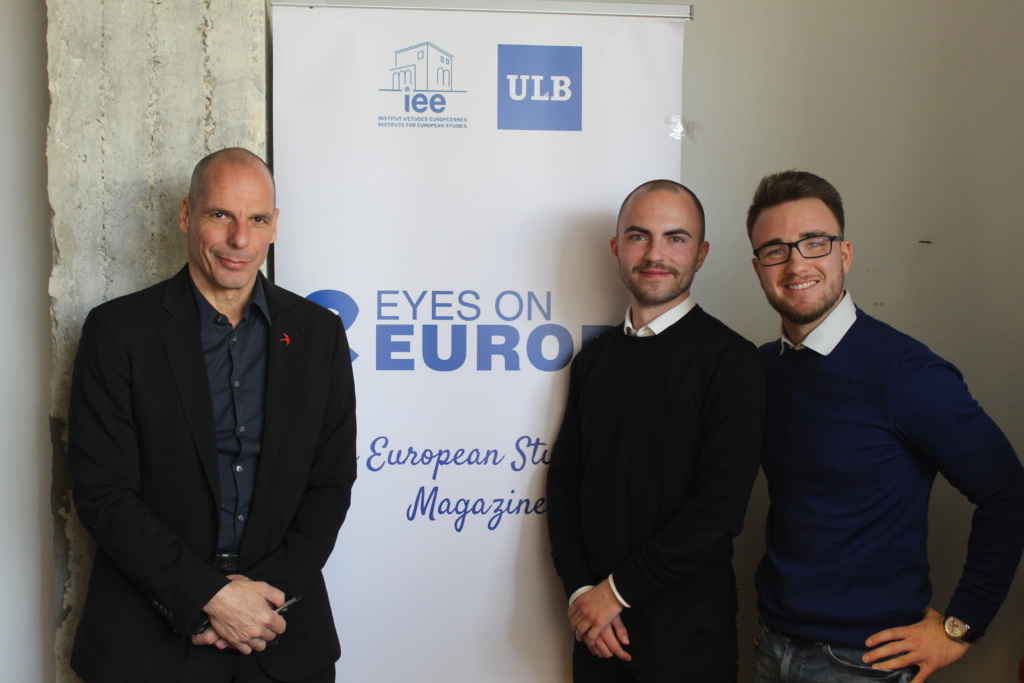Tête-à-tête with Yanis Varoufakis
04 April 2019 /

After a 2 hours conference on his political program, Yanis Varoufakis agreed to join us for a tête-à-tête interview. He gave us some insights into his personal motivation and how he would like to spend his free time. Although his political project is foredoomed, he may bring some fresh air into the EU landscape.
Black leather boots, black pants, black suit coat and a dark blue shirt – the former Greek finance minister appeared more formal than I would have imagined, given the context of a students conference. After 2 hours of answering questions on EU integration and his pan-European, cross-border movement Diem25, Yanis Varoufakis did not hesitate to go for a tête-à-tête interview about himself as a person.
“I never wanted to be a politician. And I would never have been one if Europe hadn’t started disintegrating and if Greece hadn’t gone bankrupt.” Varoufakis makes no bones about his nonconformist attitude. In his recent book “Adults in the Room” he portrays himself as an outsider at odds with the political establishment. Likewise, his vocabulary during our conversation shows that his recent political comeback did not change his mindset. He speaks about a “society with monstrous lies, where it is easy to appear as a rebel”, “the regressives” and that he “wouldn’t have to bother if things were not imploding”. In a certain way his uncomplicated explanations and his understandable reasoning for simple solutions make him appear as a populist, his enemies would even call him a conspiracist.
“I never wanted to be a politician. And I would never have been one if Europe hadn’t started disintegrating and if Greece hadn’t gone bankrupt.”
But that’s only half the story. While national states across Europe are on the rise and extreme right-wing parties swipe votes from anywhere, the political left is dispersed, debating about whether to fight or promote the EU. In the meantime, Varoufakis runs for European elections with a leftist and pan-European countermovement. On top of that, his name will appear exclusively on German ballots, because he decided to present his candidacy in Germany – not to say Schäubleland. In short, he runs for parliament in the country of his arch-enemy with a political program that lately loses more and more supporters. His project is foredoomed, it would be quite optimistic to say that Diem25 will become a major movement in the next five years, but Varoufakis doesn’t mind. He presents himself as a utopian: “I wish that I lived in a society where everything worked well and I didn’t have to bother. My great dream is to stay home and to write science fiction.” Sure, one can criticize him for being simplistic, but after all he sticks to his principles no matter the political climate.
And his simplicity does not mean that his ideas would lack of substance. Varoufakis counts on an ample and international academic career and he gained his deep political insights as an advisor long before he served as finance minister. To me, he also appeared very self-reflective and contemplative: Touching on his tour around the world, I achieved to draw him out his standard political phrases. He spoke about his wife’s art project, with whom he visited various conflict zones, and drifted away in an almost philosophical recapitulation of globalization. “Those were the good times. That was what I was doing when I was happy and free,” he referred to his journey.
“I wish that I lived in a society where everything worked well and I didn’t have to bother.”
But he did not appear unhappy to me. His face somehow revealed a bit of stress and the challenge of self-control when 30 persons are simultaneously asking for a photo. However, he was very friendly, did not balk at being in the middle of a squealing crowd and even shook hands with some of them. The day before, he had turned 58 years and nonetheless, he appeared to be in his element in the middle of a bunch of twenty-year-old students who still watch the political game as outsiders, just like he pretends to do.
Yes, maybe Varoufakis features an urge to self-portrayal, but as long as it does not devolve into Trumpish behavior, who would oppose the idea of more media-related EU officials? How many of those free-spirits and political activists have been stifled by party-lines and hierarchical structures? Varoufakis remains one of the few that go against the odds, and although he opposes current EU politics, it would be false to call him Eurosceptic. Far from it! His approach is very federalist – a taboo word in current EU debates. It remains to be seen whether the Germans will elect him to the European Parliament (he needs around one percent) and how Diem25 will be able to extend its network. In any case there are a lot of political challenges ahead for someone who never wanted to be a politician.
Niklas Franke is Eyes on Europe’s editor-in-chief.
